Strategic management in security sector institutions
Through its Strategic Management in Security Sector Programme, DCAF works to enhance the capacities of national governance bodies and security sector institutions for developing and implementing key strategic and policy documents, and to strengthen awareness, legal and institutional frameworks, and capacities of security sector agencies in strategic areas of institutional management and reform.
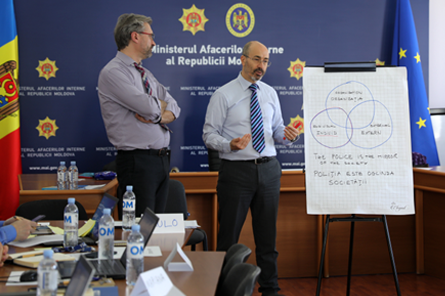
Workstreams/Projects
Learn more in the Project Factsheet
Read about the main achievements of the project in the bi-annual update published by DCAF.
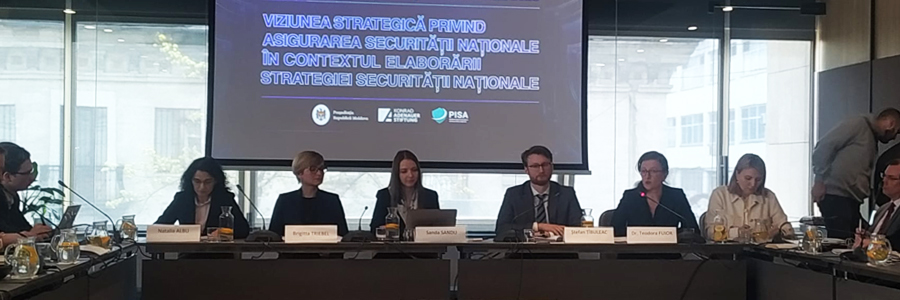
DCAF provides support to the Parliament, the Secretariat of the Supreme Security Council, and judicial institutes of Moldova to enhance national security governance.
This includes efforts to increase the executive and legislative capacities of those institutions, to contribute to the development of security sector strategies and policies, to advance the legislative and regulatory development of the security sector in a responsive manner, and to engage in meaningful coordination and oversight of security sector agencies. The project provides expert support in ongoing legislative processes, and offers opportunities for the members of parliament and staff from national governance bodies to attend trainings, workshops, or conferences on topics of relevance for security sector governance and reform, to enhance their expertise and knowledge.
Examples of project activities/processes:
- Expert opinion on the draft Laws on the Security and Intelligence Service of the Republic of Moldova (SIS law) and the counterintelligence and external intelligence activity (CI law)
February-July 2023, Chisinau, Moldova. - Participation of the People’s Advocate (Ombudsman) of Moldova in the 15th International Conference of Ombuds Institutions for the Armed Forces (15ICOAF)
June 2023, Vienna, Austria. - Workshop on Disaster Risk Management, Civil Preparedness, and Resilience Building
December 2023, Chisinau, Moldova - Parliamentary Expert Hearing on setting up an effective mechanism for parliamentary oversight of intelligence activities
March 2024, Chisinau, Moldova - Participation in Working Group for the drafting of new legislation on intelligence oversight by parliamentary committees
Started March 2024, Chisinau, Moldova - Development of a practical guideline on intelligence oversight by a Working Group of authors from parliamentary standing committees and departments
Started in September 2024, Chisinau, Moldova - Development of a judicial benchbook on the use of special investigative and counterintelligence measures by law enforcement agencies and intelligence services
Started in September 2024, Chisinau, Moldova - Contribution to the organisation of the Moldova Security Forum 2024
19-20 November 2024, Chisinau, Moldova - Development of a Study on the Protection of Classified Information and the Free Access to Information of Public Interest in Moldova
Started in November 2024, Chisinau, Moldova
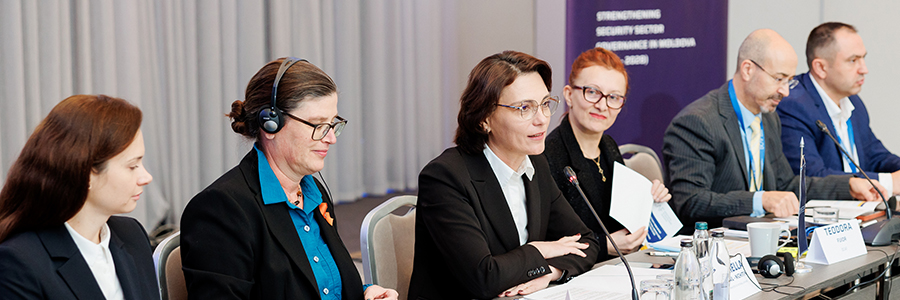
The project works on building and strengthening the strategic and operational management capacities of the Ministry of Internal Affairs (MIA) and the General Police Inspectorate (GPI).
DCAF helps the MIA and GPI to build capacities for strategic planning and management, enhance their capacities for integrity planning and for the prevention and reduction of corruption or other integrity violations, develop legislative proposals and internal regulations, and promote gender sensitivity in their policies, action plans, and curricula.
The project offers training opportunities to the Ministry of Internal Affairs and the General Police Inspectorate staff to increase their skills and knowledge, and offers a platform for exchange and learning from international good practices..
Examples of project activities/processes:
- Workshop on strategic planning and training design for the MIA
March 2023, Chisinau, Moldova. - Workshop on integrity planning within the MIA and its subordinated institutions
April 2023, Chisinau, Moldova. - Regional conference on standard operating procedures for the use of body-worn cameras in law enforcement agencies
June 2023, Chisinau, Moldova. - Hybrid conference on strategic planning and management linked to the EU accession process
June 2023, Chisinau, Moldova. - Functional analysis of strategic planning within the MIA and its subordinated institutions
June-December 2023, Chisinau, Moldova. - Support to the MIA on developing indicators for measuring gender equality in Moldova security and defense institutions
September 2023 - August 2024, Chisinau, Moldova. - Building project management capacities with the Women’s Police Association
May 2024 – December 2025. - Train-the-trainers (Facilitator’s Course) for building integrity in the MIA and refresher courses
2023 - 2025, Chisinau, Moldova. - Workshop on risk management
December 2023, Chisinau, Moldova. - Development of studies on human resource management and institutional integrity in terms of recruitment and promotion
July 2023 – January 2024, Chisinau, Moldova. - High-level knowledge exchange between European police inspectorates
December 2023, Chisinau, Moldova. - Support for designating a training room for the Internal Protection and Anti-corruption Service (IPAS) in the MIA
March 2023, Chisinau, Moldova - Donation of software for project management
2024, Chisinau Moldova. - Training on reporting and data collection for the mid-term reports of the sectoral programmes linked with the Strategy for the Development of Home Affairs in the MIA
July – November 2024, Chisinau Moldova. - Training for Certification in PM2 Methodology in the MIA
September 2024, Chisinau Moldova.
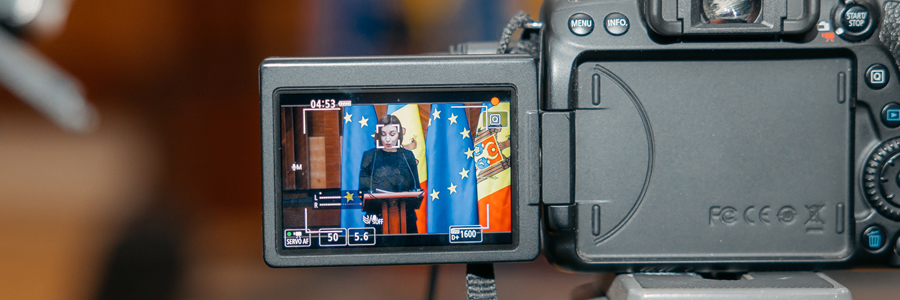
DCAF aims to enhance public trust and awareness of security sector reforms through engagement with state security sector institutions, civil society organisations, and media.
On one side, the project supports state institutions in their external communication about reform processes. This is achieved through support to the institutions in their outreach activities and their efforts in establishing strategic communication plans. On the other side, the project aims to enhance civil society’s ability to contribute to an informed debate on security and rule of law topics. This is done through the steering of learning and knowledge production processes involving local civil society organisations and participants with non-governmental backgrounds, on topics of relevance for democratic governance of the security sector.
Examples of project activities/processes:
- Development of a Cartography on International Assistance in Moldova
May 2023 - January 2024, Chisinau, Moldova. - Development of an Independant Report on Security Sector Governance in Moldova
June 2023 - March 2024, Chisinau, Moldova. - Roundtable on Security Sector Governance in Moldova
June 2023, Chisinau, Moldova. - Women for Security Day
June 2023, Chisinau, Moldova. - “MIA for integrity – Integrity Cup” football competition for raising awareness on anti-corruption and integrity
December 2023, Chisinau, Moldova. - Funding of a Communication Expert within the Ministry of Internal Affairs
Started in September 2024, Chisinau, Moldova - Security Sector Governance Discussion Club
Starting December 2024, Chisinau, Moldova
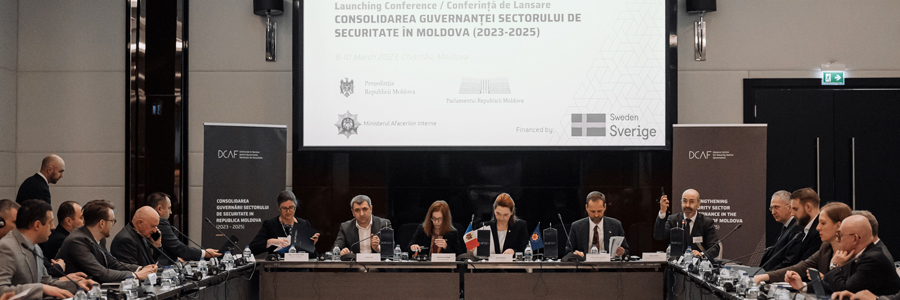 DCAF facilitates multi-stakeholder dialogue and promotes multi-stakeholder engagement between state and non-state actors, to enhance trust and develop models of cooperation, while discussing current trends and challenges of security sector reform in the country.
DCAF facilitates multi-stakeholder dialogue and promotes multi-stakeholder engagement between state and non-state actors, to enhance trust and develop models of cooperation, while discussing current trends and challenges of security sector reform in the country.
The multi-stakeholder roundtables are organised once or twice a year.
Read about our SSGM launching conference on the 9-10 March 2023 in Chisinau, Moldova
Other roundtables organised within the project:
- Building Resilience in Moldova, 10-11 October 2023 in Chisinau, Moldova
- Launch event for the Independent Report on Security Sector Governance in Moldova, 12 March 2024 in Chisinau, Moldova
- Regional Conference – Building Integrity from Within: Strengthening Internal Controls for a Corruption-free Future, 3-4 December 2024 in Chisinau, Moldova
Over the course of 2024, the project partnered up with the Platform for Security and Defense Initiatives to implement a six-months public information campaign, to raise awareness on security policies and reforms in Moldova among public servants working in security institutions and Moldovan citizens.
The campaign produced a series of articles, infographics, testimonials and explanatory materials on various topics of the security sector.
Check out our series of VOX Populi and expert opinions in the streets of Chisinau in the videos below:
VOX Populi: What are the biggest security threats in the Republic of Moldova?
VOX Populi: What is the role of the European Union as a security actor in the Republic of Moldova?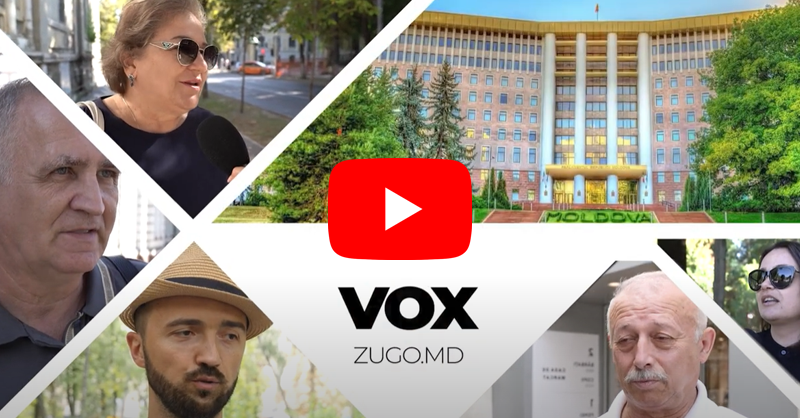
VOX Populi: How do you think the country's reintegration process should be solved?
Understanding the security environment in the Republic of Moldova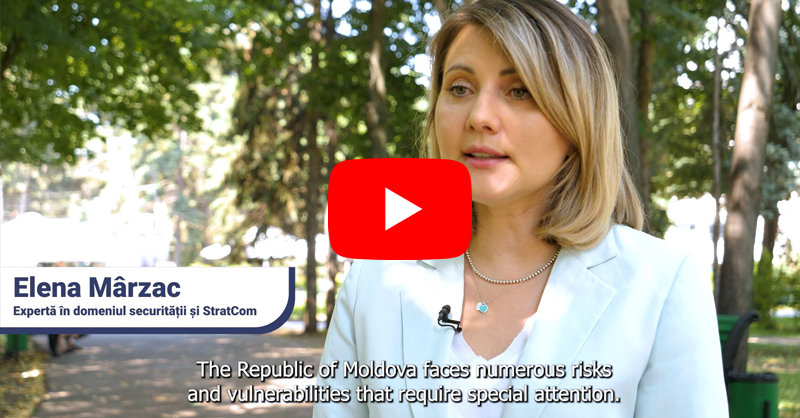
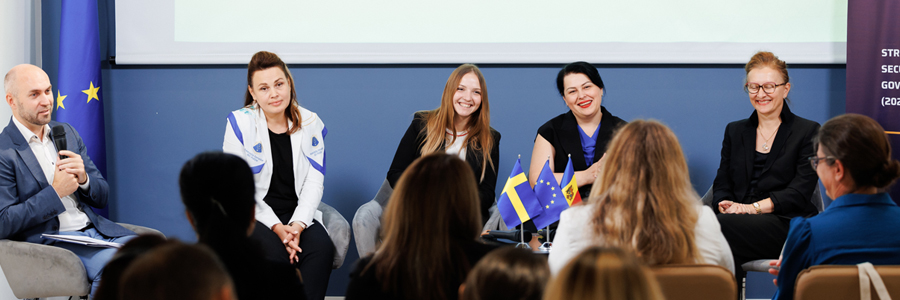
In summer 2024, DCAF signed an extension of the project, prolonging the initial end from 2025 to 2028, and including an expansion in the scope of activities, new workstreams and new partnerships.
As part of the project extension, a new partnership was started with the Swedish Civil Contingencies Agency (MSB), to jointly implement activities supporting the crisis management system of Moldova and strengthening the capacities of institutions involved in disaster risk reduction, crisis management, and civil protection.
DCAF is also giving more solid support to Moldovan civil society organisations (CSOs), to consolidate their capacities for research, advocacy, watchdog activities, public outreach, and independent project management. DCAF is providing three CSOs with sub-grants to support their institutional development and organisational growth to function as independent organisations.
An “extension launch event” was held on 12 September 2024 in Chisinau, Moldova, to officially kick start the partnership and sub-grants implementation.
Read about the main achievements of the project in the bi-annual newsletters published by DCAF:
Key Resources
Contacts
Paulo Costa, Principal Programme Manager (p.costa@dcaf.ch)
Teodora Fuior, Principal Programme Manager (t.fuior@dcaf.ch)

